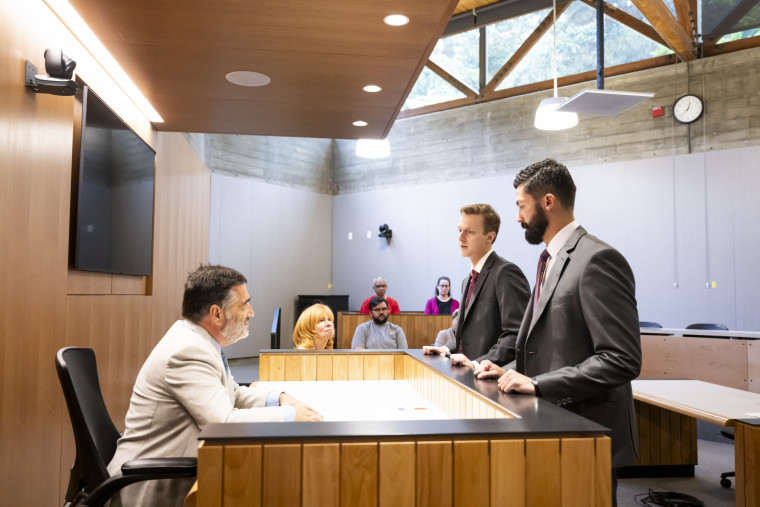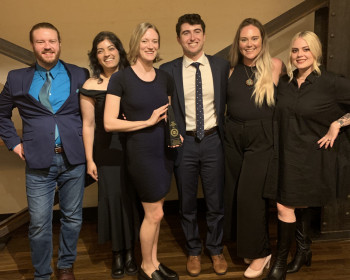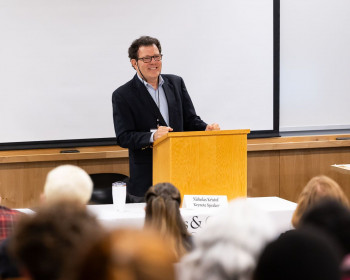Mock Trial and Moot Court Present Unparalleled Opportunities for Students
Students share their experiences with mock trial and moot court at Lewis & Clark, highlighting the unique opportunity students have to gain litigation skills and experience while studying for their degrees.
Open gallery

Lewis & Clark’s Moot Court and Mock Trial opportunities provide a unique and invaluable experience to students, challenging them in new ways and helping them build hands-on legal skills through oral arguments, researching and writing legal briefs, legal strategy and analysis, and so much more. At the law school, Moot Court and Mock Trial can be offered through a number of courses, and in some cases lead to regional and national competitions.
What do these courses mean to rising attorneys? We asked a few students to describe their experience.
Ashwin Kushwaha ’25 is a second-year law student in the Environmental & Natural Resources Law program with a passion for environmental advocacy. He signed up for the Environmental Moot Court course, taught by Professor Craig Johnston, with the intention of sharpening his legal skills. In the end, he learned so much more. “Participating in Environmental Moot Court has been one of, if not the most valuable learning experience I have had so far since beginning law school,” said Kushwaha. “Moot Court provided me with a venue to enhance my legal research, writing, reasoning, and oral advocacy skills, all within the realm of one course.”
Kushwaha described his experience in Moot Court as challenging, but ultimately rewarding. “It requires a substantial investment of effort and commitment and really puts on the pressure at some points – all of which are well worth the benefits of this experience.”
Carter Jane Pond ’25, a second-year law student studying class actions and complex litigation, shared a similar experience in her Mock Trial course, taught by Professor Simon Whang and Judge Edward Kroll. “Mock Trial was where everything I learned in class met the real world,” said Pond. “It wasn’t just about reciting laws; it was strategy, quick thinking, and solid argumentation – the whole legal shebang. This experience was foundational in preparing me for the twists and turns of actual legal practice.”
Although Moot Court and Mock Trial train students in very similar skill sets such as legal briefing, argumentation, and legal strategizing, they are different in one key way: Where Mock Trial teaches students how to try a case, featuring all the procedural and evidentiary protocols they would experience in a trial court, Moot Court instructs students on skills they will need for appellate court, focusing on oral argumentation before a panel of judges.
“[Moot Court] is unique compared to most other courses, where each day may cover different cases and legal issues,” said Kushwaha. Through oral arguments, “students have the opportunity to truly understand the complexities and depth of what it takes to create a convincing legal argument.”
For Pond, Mock Trial taught her how to deliver arguments with conviction through the lens of a true-to-life trial. “It’s hands-on, practical, and as real as it gets without being in an actual courtroom,” said Pond. “For any law student eyeing the courtroom, this is where you start feeling the pulse of real litigation. It’s an unmatched opportunity to turn theory into practice.”
Through Moot Court, some Lewis & Clark students also have the opportunity to join national teams and compete against other teams from around the U.S. and the globe. Lewis & Clark’s Jessup International Moot Court Team participates in the world’s largest Moot Court competition, with competing teams from over 500 law schools in more than 80 countries. “Jessup has been an amazing experience to develop a deep understanding of public international law and the workings of the international legal system,“ said Lily Barchers ’24, 3L and member of the Jessup Team. “This was my second year competing on the team, and we are blessed with an extraordinary coaching team that really helps us get the most out of the program. I can’t recommend it enough!”
Students can also participate in the National Trial Competition, hosted by the American College of Trial Lawyers, where they have a chance to compete with students from more than 140 law schools. This year, Lewis & Clark 3Ls Amy Sohlberg and Jacob Serafini placed first in our region. In April, they will compete at nationals in Houston against other top teams for a national championship title.
Lewis & Clark’s Environmental Moot Court Team is also highly decorated, advancing to the top three finals competition fourteen times and winning seven national championship titles in the past twenty years.
For students, taking these classes opens them to unparalleled legal skills and a world of opportunities. “Now that I have completed the course, I look back at the experience as an invaluable one,” said Kushwaha. “It made me a better law student and provided me with hands-on experience and skills which will be essential to my future in the legal field.”
To learn more about opportunities to get involved with Mock Trial and Moot Court, please visit our website here.
Law Communications is located in room 304 of Legal Research Center (LRC) on the law Campus.
MSC: 51
email jasbury@lclark.edu
voice 503-768-6605
Cell: 626-676-7923
Assistant Dean,
Communications and External Relations, Law School
Judy Asbury
Law Communications
Lewis & Clark Law School
10101 S. Terwilliger Boulevard MSC 51
Portland OR 97219

